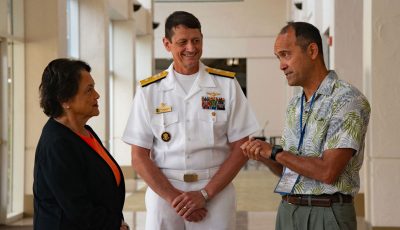Balabagan now an anti-human trafficking advocate

Sarah Balabagan, right, and several members of Church 360 arrange some items that they will need for their mission of spreading God’s word. The former overseas Filipino contract worker was on Saipan last week for a one-day concert. (Jon Perez)
Former overseas contact worker Sarah Balabagan has been sharing her own experiences of being a human trafficking victim in the early 1990s. She was forced to work in the United Arab Emirates at the age of 14 with her recruiter faking documents to show that she’s 28 years old.
“I want to raise awareness on the issue of human trafficking after I experienced it first hand,” Balabagan said in a mix of English and Filipino. She had a concert in Guam and on Saipan last week as part of Church 360’s community programs.
“I became a resource speaker in several forums about human trafficking in the U.S. where I talked about my experiences. We must fight human trafficking especially against women,” she added.
Balabagan said that human trafficking victims sometimes could not escape their situation or worse are killed. Forced labor, sexual exploitation, and slavery are some of the forms of the trade. A United Nations study in 2008 revealed that an estimated close to 2.5 million people from 127 different countries are being brought in illegally to 137 countries worldwide.
Balabagan, who came from a poor Muslim family in Maguindanao province in the Philippines, worked as a domestic helper in the UAE to help her family. In the UAE, a widower’s family employed her, and despite hearing tales of rape from other Filipino domestic helpers, she was certain that her employer would not attempt to do such a thing since they were both Muslims.
But Balabagan’s employer, Almas Mohammed al-Baloushi, allegedly made sexual advances on her and in July 1994 purportedly tried to rape her. She killed al-Baloushi in self-defense by stabbing him. She was tried and the UAE court found her guilty of manslaughter and sentenced her to seven years imprisonment and ordered to pay 150,000 Dirhams ($41,000) as blood money to her employer’s relatives.
The prosecution team, however, appealed the verdict as they wanted the maximum penalty of death by firing squad. The Islamic Court upheld the initial ruling after finding no evidence of rape and convicted her of premeditated murder in September 1995.
Her situation hogged the international headlines as many saw her case as a symbol of the poor treatment received by domestic helpers in several countries in the Middle East. She managed to escape her execution after the UAE government appealed to al-Baloushi’s family, who then agreed for a lesser offense of one year imprisonment and being caned 100 times.
“I no longer have bitterness on what I experienced in the past. I learned how to forgive and to also accept forgiveness. I had peace of mind and personal healing through counseling and the help of a lot of people,” said Balabagan, who converted from Islam to Christianity.
“Now, my outlook in life has changed. My dream back then was just to help my family but I think that’s not only God’s mission for me. I now share my past experiences and how God changed my life to different organizations, churches, and countries. I just want to give back on my newfound life.”
Balabagan has also visited the United States, Guam, Singapore, Hong Kong, and Macau. “I saw the response of my countrymen who are working as OFWs and domestic helpers. They can relate to my stories and God’s word, and that gives them hope.”



























